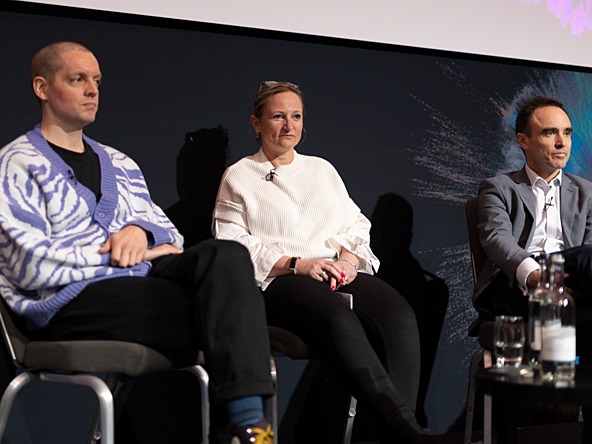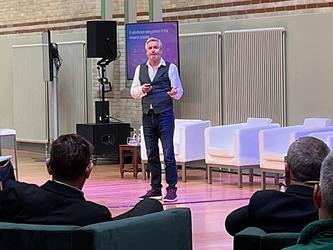Forget the hype on AI and focus on added value

Speaking in a panel session, Andrew Jerina (pictured left), head of research at Flume, told the conference that while AI was receiving a lot of hype at the moment, this was not uncommon for new tools and methodologies in the research industry.
“Every so often, something comes in and gets a lot of hype,” he said. “What actually happens is you go through that period we’re in with AI where everyone is scrabbling around for what it’s going to do and how it will transform things, but what actually happens is it transforms what we do in incremental ways.
“Behavioural science, neuroscience and big data have been embraced by the industry, tested out and we have figured out which bits of it are helpful and do give us new understanding, and which bits are less helpful and gradually fall by the wayside.
“There’s a danger we are chasing after AI and forget about the fundamental objectives of understanding people overall and that a range of methods is good. We should be open to new methods but we should be sceptical about them.”
Jerina added that history suggests that AI “isn’t going to eliminate my job, but it probably will add significant value to our processes”.
Zoe Ruffels (pictured centre), global head, vice-president insights, at Mars Pet Care, told the panel that researchers needed to make sure they are advocating the right tools for the right projects.
“I think there’s a considerable amount of hype in the industry about new techniques,” she said. “The problem is stakeholders get wrapped up in that hype, and disruption is often conducive with annihilation and replacement of everything that existed before.
“We have a considerable role to play in educating our stakeholders about this. We are the experts, we know there’s a toolbox of things that we have at our disposal to answer questions, and each of those tools plays a purpose and role in answering specific types of questions.
“We as experts need to make sure that we’re educating our stakeholders and are taking them on that journey. That’s not easy – the investment that’s going into data and data science often overshadows more traditional methods.”
Ruffels called for less ‘wild’ experimentation and more ‘wise’ experimentation with new innovations such as AI, with clarity on why new tools were being introduced in the first place and the value they could add.
“It is not experimentation for experimentation’s sake, it is what value you can add through that data or capability that can bring that competitive advantage, that deeper insight or new perspective our competitors don’t have.”
Also speaking on the panel, Paul Hudson (pictured right), founder and chief executive at FlexMR, argued AI could be a game changer, if used correctly.
“I think AI is different – it will disrupt everything we do in the space of 10 years, but it is not really a method, it will infiltrate and affect every other method we’ve ever had.
“The tricky part with AI is working out where it adds value, how to use it, how to build it into what we do without it destroying the other quality tenets we have built. Understanding how to make use of it will be difficult.”
Hudson added that researchers needed to stop focusing on data and instead concentrate on providing interpretation to support business decision making.
“The world has moved on. Data is democratised. But the thing people don’t understand is how decisions are made,” he explained.
“We understand a lot about how consumers make decisions, but I don’t think we understand anywhere near as much about how businesses make decisions.”
Hudson concluded: “The next thing for me is focusing more on actions – let’s understand more how decisions are made and talk less about the collection and method.”
Rose Tomlins, brand director at Bally’s Interactive, said the constant pursuit of innovation was overshadowing the insight industry’s biggest strengths.
“What has struck me is how much we anchor our value on methodologies and how much we think we are adding value by doing something better and more innovative,” she said. “By doing that, we are massively undervaluing our strategic value and importance.”
Many businesses are already drowning in data, she added. “There’s a bit of trend to want to add to those numbers and come up with a better number or model,” Tomlins said.
“What we need now is less numbers and more of the understanding behind them.”

We hope you enjoyed this article.
Research Live is published by MRS.
The Market Research Society (MRS) exists to promote and protect the research sector, showcasing how research delivers impact for businesses and government.
Members of MRS enjoy many benefits including tailoured policy guidance, discounts on training and conferences, and access to member-only content.
For example, there's an archive of winning case studies from over a decade of MRS Awards.
Find out more about the benefits of joining MRS here.














0 Comments